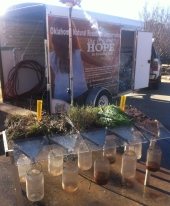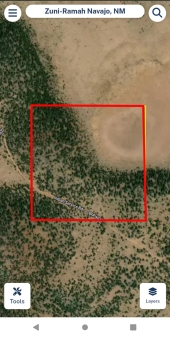













Check out Redhawk's soil series: https://permies.com/wiki/redhawk-soil





 2
2




Steve Smyth wrote:Do you all think that gardening under the power lines is a problem?

 1
1




Joseph Lofthouse wrote:
Does the power company pay a royalty for the easement? Is it enough to cover the property taxes?




Joseph Lofthouse wrote:
Around here, the going rental rate for agricultural property is negative... By that I mean that people pretty much have to pay to have a farmer take care of it for them. There is so much land that is a burden to the property owner. They wish someone/anyone would take care of it for them to relieve them of the burden. I turn down offers every year to take care of more rent-free land. Before I realized that the true rental cost of agricultural land in this area is zero, I was paying about $40 per acre per year. My grandmother for her land that I didn't farm was collecting about $50 per acre per year.




John Saltveit wrote:I wouldn't site your house under power lines. There are books on the topic, like "Zapped". It's an issue. How big? I don't know.
John S
PDX OR




Deb Stephens wrote:
Steve, We have power lines running across two different portions of our property So ... to finally answer your question ...
YES, you can garden in a power cut, but look out for compacted soil, people and animals coming through, potential herbicide and other chemical residues in your soil and crews with heavy machinery suddenly showing up to drive through without notice.




"The rule of no realm is mine. But all worthy things that are in peril as the world now stands, these are my care. And for my part, I shall not wholly fail in my task if anything that passes through this night can still grow fairer or bear fruit and flower again in days to come. For I too am a steward. Did you not know?" Gandolf
 1
1




"The rule of no realm is mine. But all worthy things that are in peril as the world now stands, these are my care. And for my part, I shall not wholly fail in my task if anything that passes through this night can still grow fairer or bear fruit and flower again in days to come. For I too am a steward. Did you not know?" Gandolf
 1
1




Marco Banks wrote:One more thought: $250 a month for something they are paying to upkeep seems WAY too much. If you were to assume all liability for maintaining the property, I'd think they'd want you to take the responsibility off their hands. Offer them a thousand bucks a year, with a contract that when you are done with the land, you'll remove everything man-made from the site.
Getting the language right on the contract would be the big thing for them. Assumption of all risk and liability on your part is what they'll want to see.
But if you framed it as a public relations positive for them, they might like the idea more. You could say, "I would love for you to promote the fact that on this formerly weedy and unused space that you sprayed and bulldozed, there is now a thriving small business that provides organic produce to the community." They can feel free to use your space in their advertising and PR efforts.








 3
3








Dale Hodgins wrote:I met a fellow who made a deal to control all growth to below 8 feet on his easement. He grows Christmas trees. They pay him a small amount each year.




Country oriented nerd with primary interests in alternate energy in particular solar. Dabble in gardening, trees, cob, soil building and a host of others.





If the description was not clear here are two pictures showing the idea.
The first is how the lots are configured today. The second shows how it may look after a lot line adjustment.
Hans Albert Quistorff, LMT projects on permies Hans Massage Qberry Farm magnet therapy gmail hquistorff




Joseph Lofthouse wrote:
Around here, the going rental rate for agricultural property is negative... By that I mean that people pretty much have to pay to have a farmer take care of it for them. There is so much land that is a burden to the property owner. They wish someone/anyone would take care of it for them to relieve them of the burden. I turn down offers every year to take care of more rent-free land. Before I realized that the true rental cost of agricultural land in this area is zero, I was paying about $40 per acre per year. My grandmother for her land that I didn't farm was collecting about $50 per acre per year.




seeking mutualism, discovering trees




 1
1





|
cat heaven has trees that produce tuna and tiny ads
permaculture and gardener gifts (stocking stuffers?)
https://permies.com/wiki/permaculture-gifts-stocking-stuffers
|

